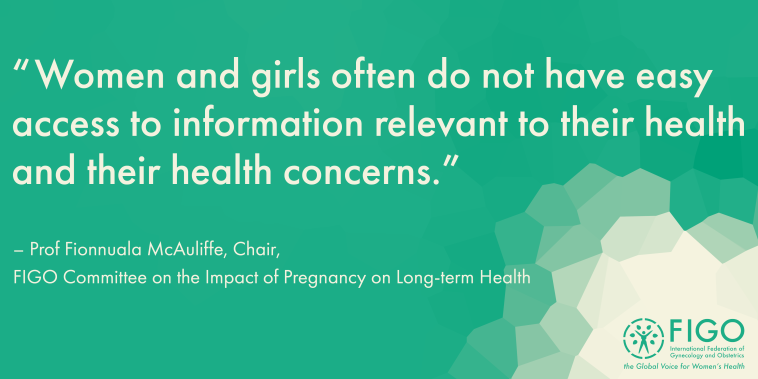#EmbraceEquity: Empowering women to make informed choices about their health and wellbeing
To mark International Women’s Day 2023, FIGO is highlighting the need to embrace equity in women’s health care. In particular, women and girls need to have access to the knowledge and accurate educational tools they need to make informed decisions about their health.

The importance of women and girls’ education to build an equitable world
According to UNICEF, girls who receive an education are more likely to lead healthy, productive lives. They grow up to participate in the decisions that most affect them, and build better futures for themselves and their families. Girls’ education is a key contributing factor to building more resilient and equitable societies.
Girls’ education has been found to improve women and children’s health in areas such as family planning, maternal health, newborn health, and survival and prevention of HIV/AIDS.
Ensuring that women and girls not only receive formal education, but also build up their knowledge about their health and bodies, is key to empowering them in health care settings so they can make informed choices and advocate for themselves.
Barriers to women and girls accessing equitable health care
However, as explained by Prof Fionnuala McAuliffe, “women and girls often do not have easy access to information relevant to their health and their health concerns”. In many settings, access to medical information is “mediated by men”, according to Prof Bo Jacobsson – this adds unnecessary barriers to knowledge.
Of course, lack of access to information is just one of the barriers that women and girls face. According to Prof Jacobsson, among many other issues in the field, the quality of women’s health care services must be improved, investments in research into women’s health needs to increase, and pregnant and lactating women should be included in clinical trials. Financial and social barriers to accessing care must also be addressed – making essential services accessible regardless of individual resources and fighting against religious and cultural taboos.
The role of OBGYNs in promoting health equity around the world
In light of these wide-ranging obstacles, Prof Jacobsson underlines that “OBGYNs need to be engaged in global leadership to highlight the need to invest in women’s health, and how an investment in women’s health is an investment in society as a whole”. In this sense, OBGYNs must become advocates for women’s human right to bodily autonomy, enabling women and girls to make informed sexual, reproductive and health care decisions.
According to Prof McAuliffe, “OBGYNs have a central role in promoting women’s health across the life course, as we see women and girls for family planning, pregnancy care and gynaecological screening throughout their lives. These are all opportunities to discuss wider health and wellbeing."
Reflecting specifically on the impact of pregnancy on long-term health, she highlights that:
Malnutrition and excessive weight affect up to 50% of the world's female population. OBGYNs have a central role in advising women about health, weight and nutrition, regardless of the country.
Additional pregnancy complications such as preeclampsia, gestational diabetes and excessive weight gain are associated with higher risk of cardiovascular disease and diabetes and obesity in later life.
Postnatal advice following pregnancy complications forms a key opportunity to advise women on how to reduce their risks of chronic disease – through maintenance of a healthy weight and healthy nutrition.
Bringing knowledge to women through accessible and accurate resources
In light of the importance of making information accessible to women around the world, Prof McAuliffe highlights the importance of practical tools such as the FIGO Nutrition Checklist to empower women with the information they need to improve their health status.
The FIGO Nutrition Checklist is an easy-to-use tool that can be completed by women with access to smartphone and internet. Upon completion of the short questionnaire, the woman receives instant feedback on her answers and high-quality professional and specialist advice on how to improve nutrition. It has been used in many countries and feedback from women and their health care professionals has been very positive.
The award-winning FIGO Nutrition Checklist consists of four sections, with questions on specific dietary requirements, body mass index, diet quality and micronutrients. The aim of these questions is to collect baseline information on weight and nutritional status that can inform health-promoting conversations before or during pregnancy and identify nutritional issues that may require further assessment or intervention. This tool empowers women to make informed choices for themselves, and to enter conversations with their health care professionals with relevant information about their nutritional needs.